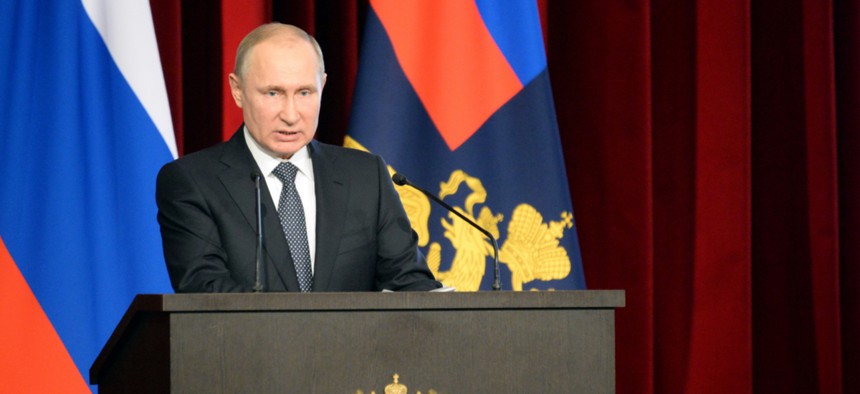
Free Wind 2014 / Shutterstock.com
Ex-Russian Spies Say The U.S. Is Losing Because It Can’t Control Social Media
Ex-Russian Spies Say The U.S. Is Losing Because It Can’t Control Social Media
Two new reports about Russia’s efforts to influence the 2016 presidential election offer the most detailed account yet of the tactics deployed to manipulate voters.
They also underscore how difficult it’s going to be for U.S. intelligence agencies to keep that from happening again.
Russian operatives were able to easily spread disinformation on social media due to the free-for-all nature of the internet, the reports show. (Both were commissioned by the Senate Intelligence Committee, and released Nov. 17.) Curbing those freedoms has already proved hard in the U.S., partly due to resistance from social media companies, but also because clamping down on online communication goes against U.S. values, three former Russian spies tell Quartz.
“The U.S. government is going to tell Google, Twitter, YouTube, ‘You guys have to do what we tell you to do?’” says Jan Neumann, a former officer with Russia’s FSB intelligence service. “That’s just not realistic.”
Here are some areas in which Russian operatives have the upper hand:
Private help
There is little daylight between Russia’s security services and the private sector, says Oleg Kalugin, a former KGB general who for a time supervised Vladimir Putin when the Russian president was an intelligence officer.
And Putin has no qualms about leaning on private companies to achieve his goals, adds Kalugin, who now lives in the Washington, DC area. The Internet Research Agency, or IRA, the firm that carried out the misinformation campaign described in the reports, was financed by Yevgeny Prigozhin, an oligarch who built his fortune through his close ties to Putin.
Tech savvy spies
According to former FSB officer Neumann, Russian intelligence services are also utilizing a cadre of officers and agents who are especially skilled at carrying out digital disinformation operations.
Joseph Wippl, a former clandestine operative for the Central Intelligence Agency, agrees. “Now they have new methods, social networks,” he says. “It plays to some of their strengths in technology and mathematics, where I think they’ve traditionally been pretty good.”
While the Kremlin has been building up its capabilities to spy on Americans, the U.S. appears to be losing ground in Russia. After the 9/11 attacks, the CIA largely shifted its focus from counterespionage to counterterrorism. Under Donald Trump, the agency has reportedly shrunk its Russian operations, hampering intelligence efforts. In August, the New York Times reported that a number of CIA informants had gone dark in the face of an aggressive counterintelligence operation by the Kremlin.
Freedom of expression
One of the reports, produced by cybersecurity firm New Knowledge, Columbia University’s Tow Center for Digital Journalism, and the Canfield Research Group, identified another weak point: Americans’ appreciation of freedom of speech. They wrote:
Our deeply-felt national scruples about misidentifying a fake account or inadvertently silencing someone, however briefly, create a welcoming environment for malign groups who masquerade as Americans or who game algorithms. Ironically even Internet Research Agency trolls laid claim to these principles, complaining publicly about being censored when Facebook moderated or banned them.
The reports’ findings suggest social media networks represent a particularly fertile terrain to spread propaganda. Neumann, who fled to the U.S. in 2008, sees them as the site of “open information warfare between East and West.”
“The victims of this war are average people for whom it is almost impossible to figure out who’s telling the truth,” he adds. “If you control social media, you win.”
And so far, Russians are clearly winning at that game, partly, because they don’t have to follow any rules, says Jack Barsky, a former KGB sleeper agent who operated inside the United States between 1973 and 1988. “We’re not as good at lying and we are more ashamed when we are caught in a lie,” says Barsky, who turned against the KGB after being arrested by American agents in 1997. “They don’t give a shit. When the powers that be don’t like the law, they break it.”
Public-private partnership
To combat attacks, governments have to regulate social media use more strongly, particularly during elections, wrote the authors of the other report, from Oxford University’s Computational Propaganda Project and New York City-based network mapping firm Graphika.
Tighter cooperation between government agencies and private-sector tech companies is also essential, the researchers from both studies say. U.S. intelligence agencies can’t fight threats if they only have limited access to the social media platforms where Russian spies are operating.
So far, though, information sharing has been minimal, including for the compilation of the two Senate reports, according to the researchers. Google, for example, gave them information about IRA’s ad buys in pdf format, instead of providing spreadsheets that could be more easily analyzed. Google, along with Facebook and Twitter, also failed to include users’ comments, making it hard to tell which of the trolling tactics was most effective






